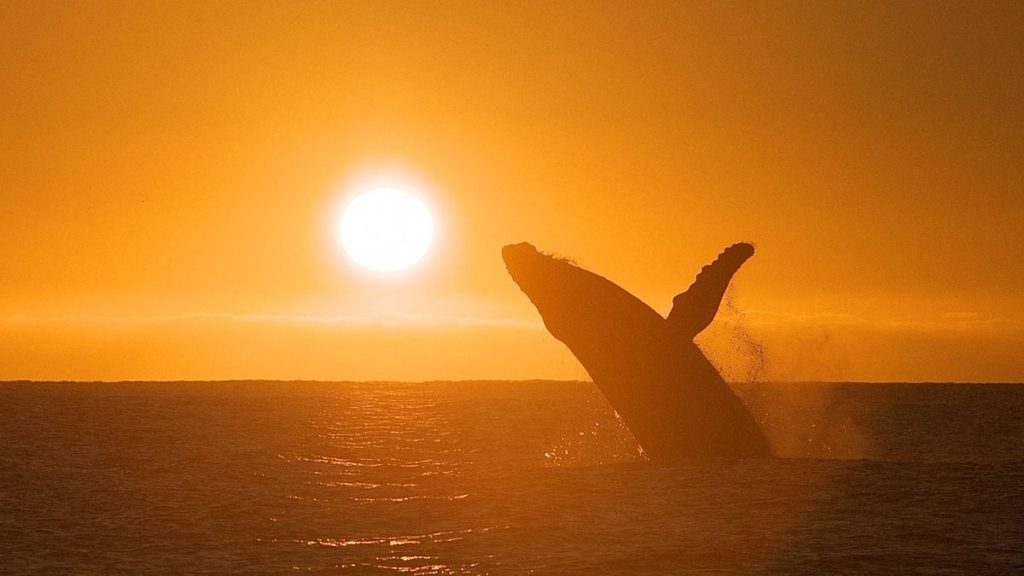Past research has suggested that the sun’s solar cycle can impact some whale species’ ability to navigate using the Earth’s magnetic field. (Image credit: Pasi Helin via Getty Images)
An unusually explosive peak in the sun’s solar cycle is fast approaching, which could spell trouble for a surprising group of animals — whales.
Past research showed that some larger whale species are more likely to get lost and accidentally beach themselves during solar storms, which become stronger and more frequent during the solar maximum — the most active phase of the sun‘s roughly 11-year cycle. This is likely tied to whales’ ability to navigate using Earth’s magnetic field, which becomes harder when solar storms smash into our planet.
A “surprising number of animals” can perceive the Earth’s magnetic field — an ability called magnetoreception — including lobsters, fish, sea turtles, migratory birds and some insects, said Kenneth Lohmann, a biologist at the University of North Carolina who has extensively studied magnetoreception. Some animals use it to orient themselves in a particular direction, like using a compass. But for others, it acts like a GPS system that lets them know exactly where they are and where they need to go, he told Live Science.
At least two whale species — gray whales (Eschrichtius robustus) and sperm whales (Physeter macrocephalus) — use magnetoreception. But studying exactly how it works for these cetaceans is difficult because scientists can’t capture and study them in the lab, Lohmann said. Other whale species, such as humpback whales (Megaptera novaeangliae), likely also use magnetoreception, but establishing this has proved equally tricky, he added.
But it is becoming clearer that, however magnetoreception works in whales, solar storms majorly mess with it.
Related: Mystery orcas with bulbous heads wash up dead in unexplained mass stranding
Gray whales are one of the main cetacean species that rely on magnetoreception. (Image credit: Shutterstock)
In 2020, scientists discovered that migrating gray whales were more than four times more likely to beach themselves during periods of increased sunspot numbers on the sun between 1985 and 2018. (Sunspot numbers are a key indicator of solar activity. The number of sunspots sharply increases in the lead-up to and during a solar maximum.)
And in 2017, researchers linked an unusually high concentration of sperm whale strandings from early 2016 to a series of solar storms that occurred around the same time.
Researchers believe that increased radio frequency noise, which often accompanies solar storms, likely disrupts the whales’ magnetic receptors, “effectively blinding them from being able to sense the magnetic field,” rather than impacting the magnetic field itself, said Jesse Granger, a sensory biologist at Duke University and lead researcher of the 2020 study. This becomes more likely during solar maximum when solar storms become more frequent, she told Live Science.
People attempt to rescue a group of stranded sperm whales in Indonesia in 2017. (It is not known what caused this stranding.) (Image credit: Shutterstock)
The next solar maximum was initially forecast to begin sometime in 2025 and be weak compared with past solar cycles. However, earlier this year, Live Science reported that the solar maximum could arrive sooner and be more active than previously predicted, possibly arriving as soon as the end of 2023 or early 2024.
If the upcoming solar cycle is more active than expected, it could pose a greater threat to whales, Granger said. Not only will there be more solar storms but they will also be stronger, which means there is a higher likelihood that their effects will be powerful enough to disrupt whales’ magnetoreception, she added.
Lohmann agreed that a more active solar maximum will likely have a greater effect on whales and could lead to an increase in the number of strandings.
Related: Extremely rare white humpback whale washes up dead on Australian beach
However, there is still an element of uncertainty surrounding this area of research.
“Our work is purely correlative, and correlation does not equal causation,” Granger said. In other words, just because strandings occur more often during periods of increased sunspots doesn’t mean for certain that storms are causing the strandings.
A dead juvenile gray whale on a beach in Mexico. (Image credit: Gerard Soury via Getty Images)
Other possible causes could be noise pollution from commercial shipping and naval exercises, or diseases, such as bird flu, Granger said. More work is needed to strengthen the link between solar activity and whale strandings, she added.
Whales may not be the only animals to be impacted by the upcoming solar maximum.
Homing pigeons and migratory birds are more likely to become lost if there are solar storms while they are flying, Lohmann said. Fish like salmon also likely rely on magnetoreception to make long migrations to spawning grounds, but scientists don’t know whether solar storms disrupt their navigation, he added.

